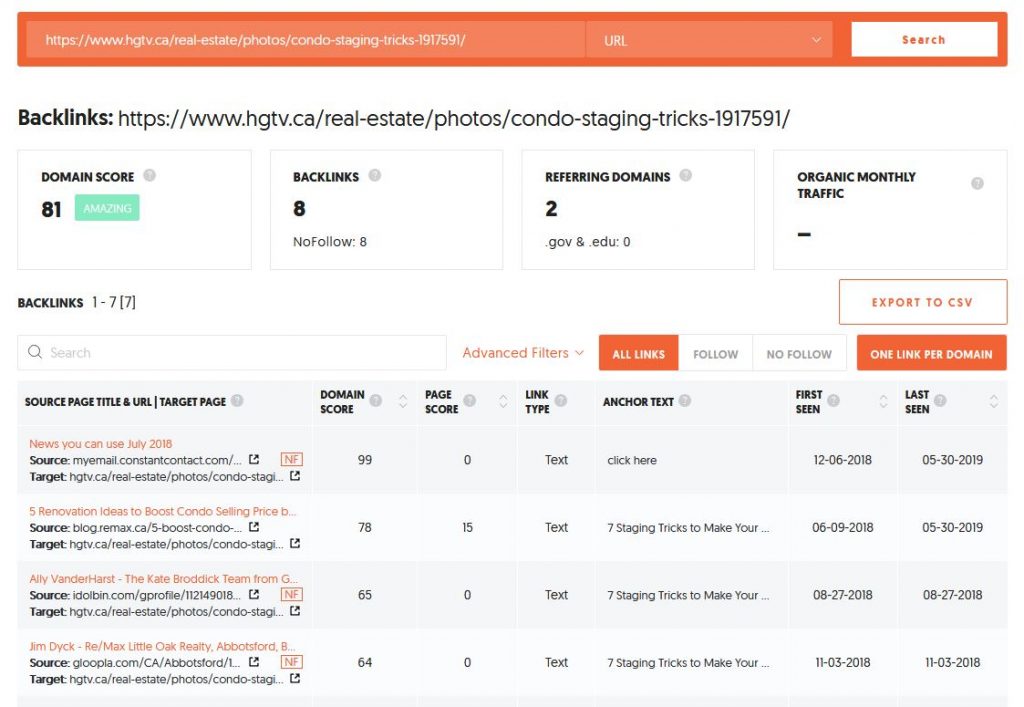There are tried-and-true ways to land relevant backlinks through competitor research. But there are ways to improve on the obvious tactics. This is your better backlink strategy.
Anybody concerned about their search engine rankings is on a constant hunt for high-quality and relevant backlinks. They aren’t that easy to acquire. After all, if landing top-tier backlinks was easy, every website would rank #1.
And that would be awkward.
The good news is that there are web pages already set up to link to your most authoritative content.
The bad news is that they are not linking to your most authoritative content. You haven’t grabbed the brass ring. And your website is not benefiting from those links.
Let’s change that right now with the step-by-step guide to getting the relevant backlinks that your website actually deserves.
Content inventory
Most website owners think of link-building as trying to get websites to link to their home page. That’s the hard way to do SEO. This is the easy way. We are going to build links to our “linkable assets”. These are pages that are worthy of being linked to because they are so comprehensive, useful and authoritative.
Make an inventory of all your most authoritative, useful content. If you have tons of it, prioritize the pieces that other website owners and bloggers would most want to link to.
If you have just a few pieces, let’s get started. You can add to your inventory over time.
If you have no authoritative, useful content, your website is suffering an existential crisis. You need to create some amazing content. Otherwise, what’s the point of your website and why would anybody want to link to it.
If you need help making your content truly link-worthy, we can help.
But let’s suppose you already have all the content you need.
We start with one piece of content. Pick your piece now, one that you know is link-worthy. (Don’t worry, I’ll wait. You can return here when you’ve selected your content.)
Find resource lists
Any content that is useful and authoritative has a place on lists of relevant useful and authoritative links. But how to find those lists?
Google is your friend. Google will tell you where those lists are. Search, and ye shall find. Here are some search terms to use:
- [topic] links
- [topic] resources
- [topic] “further reading”
CASE STUDY: finding “links” backlinks for one of our clients
One of our business services clients wanted to build links pointing to a page about a how to undertake a very specific task. The page was authoritative, as it included a step-by-step process, as well as guidelines on what to include and what not to. It deserved to be linked to as a reference.
So we headed to our favorite search engine and here’s what we searched for:
links [general field] [specific topic]
Sorry, I can’t share the competitive information about my client. But here are a few similar examples from similar niches:
- links fish tank cleaning
- “resources” staging “town houses”
- “further reading” “financial planning” budgeting
Most of the results were topical. But there were a few that were resources pages, with lists just waiting for our client’s link to be added. So we contacted the owners of the pages to sweet talk them into adding our link.
This is where most people stop, if they even get this far. Let’s take the next step.
The next step is actually something common, but I’m going to add a twist. We are going to research our competitor backlinks. The reasoning for doing this is that if somebody links to one website on a topic, they’ll want to link to all websites on that topic.
Yes, there is a grain of truth to it. But if you’ve ever tried researching competitor backlinks, you will know that it’s not that simple. There is an obvious way to do it. And there is a better way. It’s worth doing if you do it the better way.
The obvious way to find links through competitor research
Most people use a search engine to find a list of competitors. That is a viable way to do it. Let’s travel down that road for a moment. From the search engine results, they can check each one’s backlinks.
They plunk each competitor’s URL (or domain) into Neil Patel’s backlink checker tool or some other app. And they get a list of backlinks.
Why is this the obvious way to research competitor backlinks? The assumption is that if the search engine ranks these 10 or 20 or 30 websites tops for the search phrase, they must have the best backlinks. Therefore, all one has to do is:
- find the top-ranking sites
- find who links to them
- get them to link to your website, too
As I mentioned earlier, there is a grain of truth to this assumption. The problem is that real life isn’t like that. You will find that there are generally three kinds of backlink profiles among the top ranking web pages for most searches:
There are well-rounded backlink profiles. You will find some good targets for link-building outreach once you sort through the inbound links. Great harvest!
There are very thin backlink profiles, where the page is ranking mostly because of on-page factors, perhaps on an established domain, with fast download and low bounce rate. Not much there for you to pick through for harvest.
There are extensive backlink profiles beyond your reach. For instance, one competitor might have many links from a network of colleague and partners.
Another might have media links and press release links.
There could be social media profile links or links from a particular study that was released.
There might be links that resulted from a team member winning an award.
Or some might have a number of paid links.
There are many ways a website or web page can end up with a large backlink profile that is beyond your reach. These are not good backlinks for harvesting.
The better way to find links through competitor research
There is a better way.
Let’s look at our new-found comrades-in-arms…the other links on the list you just got added to. What do all the web pages on that list have in common? They are all there because the content is amazing. They are all there because somebody thought they were a useful, authoritative source of information.
None of them are there because they put down some cash.
None of them are there because they are part of a network.
None of them are there because of a marketing or media campaign.
None of them are there because their niece owns the website (probably).
These are the pages that people interested in the topic want to link to. Just like your page!
So go back to the backlink checker tool and check for links to each of these URLs.
You will find that some are rare gems. Very few people have found them, so they don’t have many inbound links. Those won’t be useful to you.
You will find that others are linked to extensively. These are the recognized authorities in the field. Many of the people linking to them will want to link to other high-authority pages. Like yours, right?
Here is the caveat. For maximum success, your page really should be better than all or most of the pages linked to. This is similar to Brian Dean’s “skyscraper technique”.
The information should be more comprehensive.
Or it should cover aspects that others miss.
Or it should make the information easier to follow through a flow chart or an explainer video or an infographic.
Why? So that when you contact these webmasters, you can tell them exactly what your page has that the other pages don’t. That’s why they should link to your page. If you need help, we’ll be happy to help you upgrade your content.
Remember that these backlinks are all relevant and on-topic. These are all pages linking to similar topics, giving great semantic context for your backlink.
Your backlink acquisition plan
There are many ways to find good quality backlinks through competitor research. And they are (almost) all good. However, the best investment for your time is when you can identify the most likely prospects.
Your best bet is to first find resource lists, then get on those lists, then search for the backlinks to your fellow listees…and replicate their backlinks.
That’s not enough, of course. You need to be active in the blogosphere, guest posting and commenting. You need to be making news. You need to be on social media. You need to have a wide and varied toolkit.
But you would be foolish to miss out on backlinks that are just waiting to be asked for.







